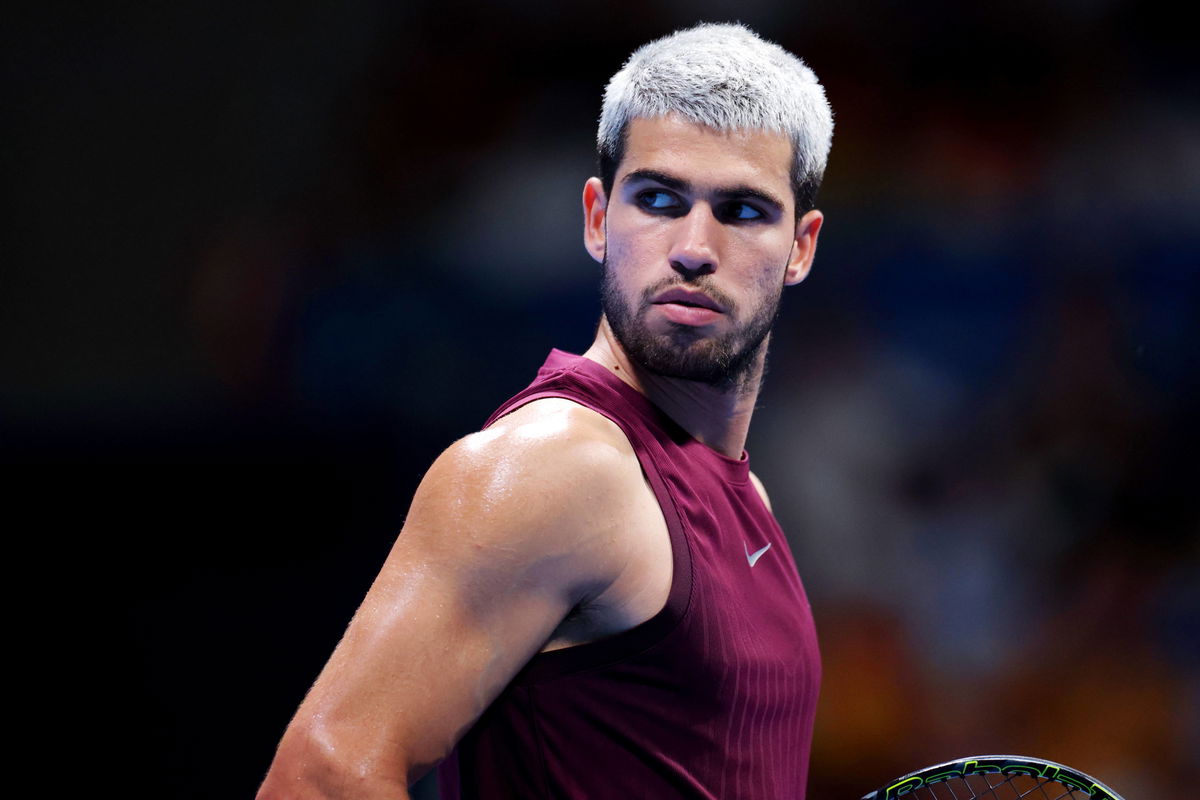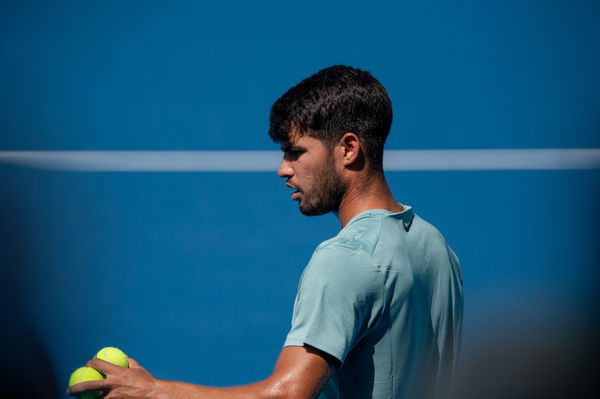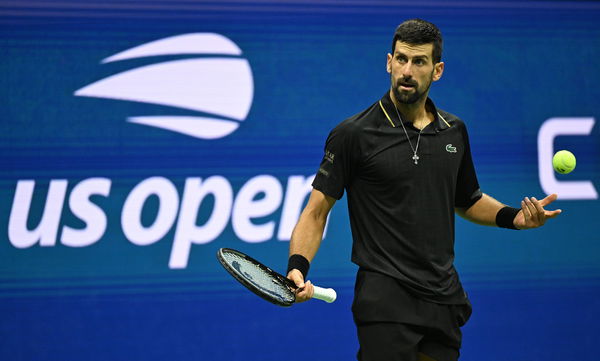Oct 3, 2025 | 3:00 PM EDT

Imago
Carlos Alcaraz ESP, SEPTEMBER 30, 2025 – Tennis : Kinoshita Group Japan Open Tennis Championships 2025 Men s Singles Final at Ariake Coliseum, Tokyo, Japan. Noxthirdxpartyxsales PUBLICATIONxNOTxINxJPN aflo_305379703

Imago
Carlos Alcaraz ESP, SEPTEMBER 30, 2025 – Tennis : Kinoshita Group Japan Open Tennis Championships 2025 Men s Singles Final at Ariake Coliseum, Tokyo, Japan. Noxthirdxpartyxsales PUBLICATIONxNOTxINxJPN aflo_305379703

Imago
Carlos Alcaraz ESP, SEPTEMBER 30, 2025 – Tennis : Kinoshita Group Japan Open Tennis Championships 2025 Men s Singles Final at Ariake Coliseum, Tokyo, Japan. Noxthirdxpartyxsales PUBLICATIONxNOTxINxJPN aflo_305379703

Imago
Carlos Alcaraz ESP, SEPTEMBER 30, 2025 – Tennis : Kinoshita Group Japan Open Tennis Championships 2025 Men s Singles Final at Ariake Coliseum, Tokyo, Japan. Noxthirdxpartyxsales PUBLICATIONxNOTxINxJPN aflo_305379703
The busy calendar in men’s and women’s tennis has long been a recurring debate. Over the years, stars like Coco Gauff and Iga Swiatek have spoken up about the relentless schedule, and now Carlos Alcaraz has joined the conversation, highlighting how the packed calendar takes a toll on both mental health and physical well-being.
Watch What’s Trending Now!
After defeating Taylor Fritz in the final to claim his eighth title of the year, Carlos Alcaraz was asked about the ATP calendar, which obliges top players to compete in several mandatory events. He responded by saying, “I agree with Iga,” before adding, “I think that the schedule is really tight. They have to do something with the schedule. I think there are too many mandatory tournaments, too many in a row.” However, Serena Williams’ former coach Rennae Stubbs did not take kindly to his remarks.
Recently, Rennae Stubbs, host of The Rennae Stubbs Tennis Podcast, took a swipe at Carlos Alcaraz for what she saw as a contradiction. On one hand, the Spaniard has been vocal about wanting a lighter schedule on the ATP Tour, yet on the other, he has signed up for several exhibition matches in December.
Stubbs explained her stance by saying, “I find it funny because, even though I love Carlos, I recently noticed that he had registered for all the exhibitions scheduled at the end of the season. It’s hard to take them seriously when they say that the calendar must be lightened so that they can go and play exhibitions in the suburbs of Miami. Again, it’s not really a criticism; it’s just a little inconsistent. Yes, it’s just that it makes me laugh.” Her remarks suggest that while Alcaraz’s concerns about the intensity of the ATP schedule are valid, his decision to commit to additional matches outside the official calendar weakens the argument.

Imago
Cincinnati Open Men s Final: Carlos Alcaraz V Jannik Sinner Carlos Alcaraz is seen during the Men s Finals match between Jannik Sinner and Carlos Alcaraz at the Cincinnati Open in Mason, Ohio, on August 18, 2025. Mason Ohio United States PUBLICATIONxNOTxINxFRA Copyright: xJasonxWhitmanx originalFilename:whitman-cincinna250818_np0rG.jpg
And when you think about it, she isn’t exactly barking up the wrong tree. The exhibition matches, often played in cities like Miami or Abu Dhabi, are not about ranking points but about entertainment, fan engagement, and lucrative paydays. Top players frequently participate in them to boost visibility and earnings, but this also contradicts the notion of wanting rest and recovery.
In Alcaraz’s case, his schedule is already lined up. On December 7, he is scheduled to face Frances Tiafoe in New Jersey, followed a day later by a clash with rising Brazilian talent Joao Fonseca in Miami. While these are exciting matches for fans, they also highlight Stubbs’ larger argument.
If players truly want the calendar to be lightened for the sake of their mental and physical health, choosing to add back-to-back exhibitions in the off-season inevitably raises questions about priorities. Stubbs may have laughed it off, but her observation captures a real contradiction that continues to define tennis’ ongoing debate around scheduling.
But changing the tennis schedule is easier said than done, and ATP veteran Novak Djokovic believes it will take unity across the board, and not just a handful of voices repeating the same concerns.
Novak Djokovic hits back at Coco Gauff and Carlos Alcaraz calendar outcry
Despite many big names citing burnout and fatigue as the season wears on, a handful still end up playing exhibition tournaments. While Novak Djokovic has no issue with that, he insists that unless players come together, they can forget about the changes they claim to want. For him, talk without action achieves little.
“In the end, as a player and someone that has been competing at the highest level for more than 20 years, I can say that the players are not united enough, and players are not participating enough when they should be,” Djokovic told the media ahead of his Rolex Shanghai Masters round of 64 match against Marin Cilic. His point? Complaints mean nothing if they aren’t backed by consistent effort.

Imago
250903 — NEW YORK, Sept. 3, 2025 — Novak Djokovic of Serbia reacts during the men s singles quarterfinal match against Taylor Fritz of the United States at the 2025 US Open tennis championships in New York, the United States, Sept. 2, 2025. SPU.S.-NEW YORK-TENNIS-US OPEN-MEN S SINGLES-DJOKOVIC VS FRITZ LixRui PUBLICATIONxNOTxINxCHN
“They make the comments, complain, and then go away. And if something is wrong after a certain amount of time, they come back again,” the 24-time Grand Slam champion continued. This stop-start approach, Djokovic stressed, is exactly the kind of inconsistency that undermines their cause. Instead, he urged players to invest their time, energy, and full commitment if they truly want change.
Even leaning on agents, teams, or parents will not work, Djokovic warned. Players must take responsibility, understand the system themselves, and figure out what can actually be changed. Only then can progress be made. “You need the top players specifically to sit down, roll up their sleeves, and really care,” he concluded. That said, will today’s stars step up to act together? Or will the cycle of complaints without action continue?


